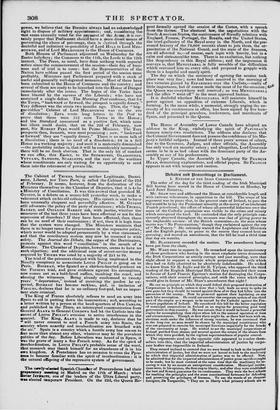The Cabinet of TRIERS, being neither Legitimate, Doctri- naire, Liberal,
nor Tiers Parti, is called the Cabinet of the 22d of February. It seems, however, from the declaration of the Ministers themselves in the Chamber of Deputies, that it is to be a Ministry of Conciliation. It was this avowal that provoked M. GUIZOT, in a debate on a money-bill yesterday week, to make a vehement attack on his old colleagues. His speech is said to have been unusually eloquent and powerfully effective. M. GUIZOT still advocates the policy of the party of resistance; while TRIERS, SAUZET, and ODILLON BARROT ask, with justice, whether the measures of the last three years have been effectual or not for the repression of disorders? If they have been effectual, then there can be no need of their continuance ; if not, then it is high time that the system were changed. The Ministers maintain that there is no longer cause for perseverance in the repressive policy, which never would be adopted permanently by a wise statesman; and that the conciliatory system may now be recurred to with safety. The Journal des Debuts, the organ of the Doctrinaires, protests against this word " conciliation " in the mouth of a Minister. The Chamber of Deputies, however, seems to have no such objection; and the additional sum of secret-service money required by TRIERS was voted by a majority of 251 to 99.
The trial of the prisoners charged with being implicated in the Neuilly conspiracy to assassinate LOUIS PHILIP is going on in Paris. BOIREAU, who figured as a chicken-hearted penitent on the FIESCHI trial, and gave evidence against his accomplices, now comes out as a bold-faced ruffian, insulting the court, and abusing the witnesses. Being already condemned to twenty years' " deportation," instead of receiving the pardon he ex- Fected, BOIREAU has become reckless, and, in imitation of iesern, declares that he is no ordinary foot-pad, but an impor- tant state criminal.
The King of France absolutely refuses to send an army into Spain to aid in putting down the insurrection ; and, according to a letter written by a person at the head-quarters of Dun CARLOS, and published in the Times, an intercepted communication from General ALAVA to General CORDOVA had let the Carlists into the secret of Louis PHILIP'S aversion to active interference in the quarrel. The King, ALAVA is made to say, declares that he "' will never consent to send a French army into Spain, the • ountry where anarchy and insubordination are breathed with the air." Spain is a country which a hostile army has reason to fear more than almost any other, whatever may be the prevalent politics of the day. Before Liberalism was heard of in Spain, it was the grave of many a fine French army. As for the spirit of Insubordination, in Louis PHILIP'S probable sense of the word, that monarch may thank himself for an abundance of it in his swn kingdom. A Frenchman has no occasion to cross the Pyre- nees to become familiar with the spirit of insubordination : it is the natural offspring of the repressive system of government.


























 Previous page
Previous page